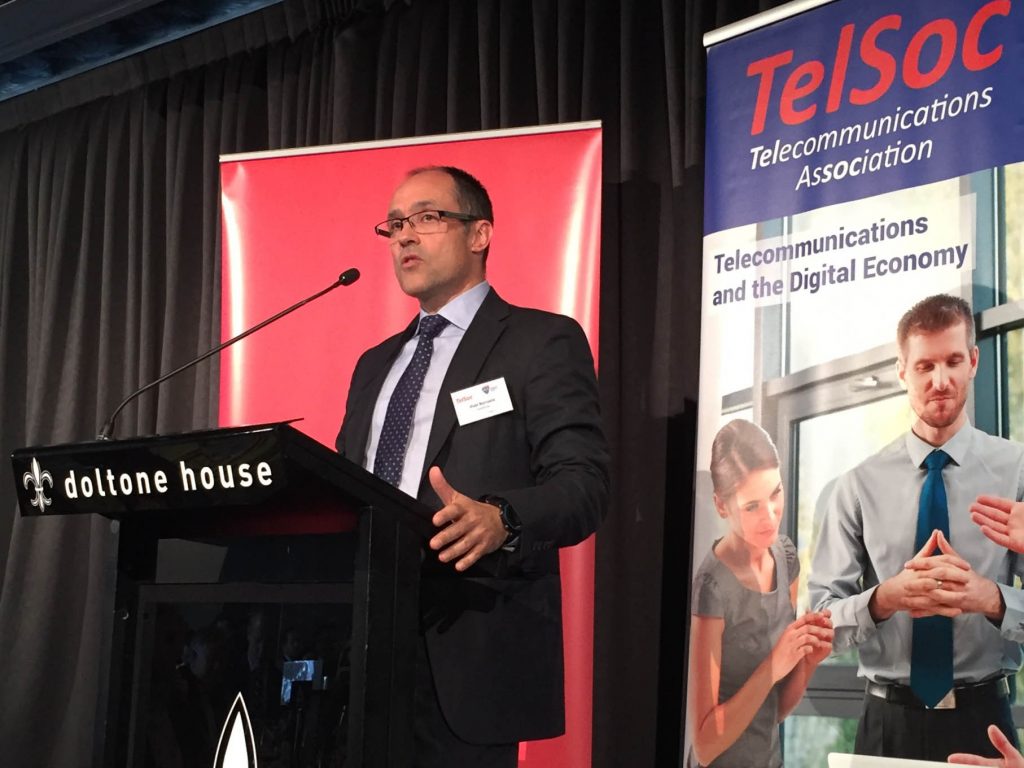Vodafone Hutchison Australia CEO Iñaki Berroeta has used his 2016 Charles Todd Oration last week to announce that Vodafone would offer fixed broadband over the National Broadband Network (NBN) by late 2017.
“Increasingly, customers are using smartphones interchangeably across all internet platforms. They expect connectivity whenever they want it, wherever they are – so they can stream music and video, send messages, make purchases, or grow their business.”
“That’s why I’m very pleased to announce today that Vodafone will be enhancing the service we offer to customers with fixed broadband home and business products through the NBN. There has been a lot of speculation about if, when and how Vodafone will enter the Australian fixed-market, and the speculation can end today.”

Vodafone’s announcement provides the company with a boost to the momentum that has been growing throughout 2016, especially after the $1 billion-plus agreement between Vodafone and TPG in September 2015 led to increasing speculation that the two companies may merge in coming years.
Whilst the possibility that Vodafone and TPG may merge in the short term is now on the backburner, the 15 year agreement between the two companies provides strong growth potential for both.
Vodafone and TPG are likely to be contenders for the remaining 2×15 MHz of spectrum in the 700 MHz band that is to be auctioned by the Australian Communications and Media Authority (ACMA) during the second quarter of 2017.
The auction could bring bids close to $1 billion as the spectrum in this prime band is considered important due to its suitability for regional network expansion.
The Charles Todd Oration, hosted annually in Sydney by the Telecommunications Association (TelSoc) and the Australian Computer Society (ACS), is a major event in the industry calendar that provides Australia’s telecommunications leaders to provide their perspective on the state of the industry.
Mr Berroeta did not disappoint the attentive audience when he spoke of the need for government and the industry to put the building blocks in place to ensure future opportunities are not missed.
In this digital age, now more than ever, we need to focus on identifying the desired outcomes and we need a co-ordinated, long-term approach,” Mr Berroeta said.
“With this in mind, I would like to look at three of the key pressing priorities for our industry – domestic roaming, Universal Service Obligation reform, and spectrum management”.
The domestic roaming declaration inquiry being undertaken by the Australian Competition and Consumer Commission (ACCC) came in for special mention when Mr Berroeta stated that “some responses which I think can quite fairly be described as bordering on hysterical.”
By alluding to the scenes that played out at the Telstra AGM held on 12 October, Mr Berroeta stated that “we need to step back from the emotion, threats and scare-tactics, and look at the long-term opportunity in a rational, fact-based manner”.
On 9 September, the ACCC Chairman Rod Sims stated that “consumers are increasingly relying on mobile services and the issue of coverage and a lack of choice in some regional areas is a particular issue that has been raised by a number of groups.”
“There has been significant interest in the questions around access to mobile networks and mobile roaming, including from representatives from regional Australia, the Regional Telecommunications Review Committee, Infrastructure Australia and the House of Representatives Agriculture Committee”.
The Productivity Commission inquiry into the Universal Service Obligation (USO) should focus on realigning the USO to provide “open infrastructure” without “the incumbent receiving $5 billion over twenty years for its copper network,” according to Mr Berroeta, as this could be seen to be “corporate welfare on a grand scale”.
For Mr Berroeta the key elements for USO reform are:
- Recognising the NBN as the universal provider of telecommunications infrastructure in Australia, and transferring the obligation from Telstra to NBN as NBN services are rolled out;
- And ensuring that any ongoing subsidies are technology-agnostic and subject to competition.
However, NBN Co has stated in its submission to the Productivity Commission that it is unable to provide the USO as it is not in its mandate and the $50 billion plus NBN is not being built with the capability and performance to meet the USO requirements. NBN Co has some explaining to do.
On spectrum management, “the lifeblood of the mobile communications industry”, Mr Berroeta stated that “I am not confident there is real clarity as to what outcomes Australia is trying to achieve in its spectrum allocation, pricing and management.”
“There seems to be a level of understanding that spectrum is vital to the industry, and that the real long-term benefits to Australia come through use of spectrum to provide competitive mobile services. However, this agreement seems to be, at times, fragmented.”
The argument put by Mr Berroeta is that “what is needed in Australia is a spectrum strategy that enables Australia to be at the forefront of technological advances. The more spectrum made available to industry, the more technology becomes available to consumers.”
“Government needs to ensure large amounts of spectrum are ready to roll out, and they are maximising the return to the taxpayer from that spectrum in a way that supports competition. All of this will become even more important in the context of 5G”.
Speaking about Vodafone’s plans for 5G, Mr Berroeta said that the company was “well-advanced” and that “we are in the planning phase for future network architecture and platforms, and participating in demonstrations with our vendors”.
Mr Berroeta’s remarks about spectrum management highlight the balancing act that is being carried out by the ACMA as there is only so much spectrum available and everyone wants their slice.
The decision by government to allocate a portion of the 3.4 to 3.7 GHz band to NBN Co to provide fixed-wireless services to about 80,000 premises came in for some criticism and Mr Berroeta stated that “there are definitely alternative ways to do this”.
Whilst it is reasonable to expect competitive tension in the telecommunications industry, Mr Berroeta’s speech highlighted the ongoing chaos surrounding aspects of telecommunications policy that has led to increasing angst and unsatisfactory competition and consumer related outcomes.
The government is currently struggling to justify its second rate NBN, so it is difficult to see how it will be able to resolve other pressing issues.
Disclosure: Dr Mark Gregory is a TelSoc board member, the managing editor of TelSoc’s Australian Journal for Telecommunications and the Digital Economy and was Vodafone’s guest at the 2016 Charles Todd Oration
Dr Mark Gregory is a Senior Lecturer in the School of Engineering at RMIT University.
Do you know more? Contact James Riley via Email.

